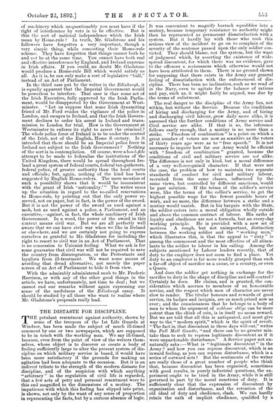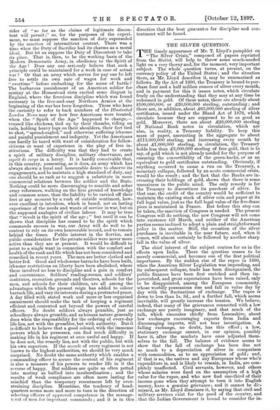THE DISTASTE FOR DISCIPLINE. T HE petulant resentment against authority, shown
by some of the troopers of the 1st Life Guards at Windsor, has been made the subject of much ill-timed comment by one or two newspapers, which are supposed to be in touch with the working man. We say ill-timed, because, even from the point of view of the writers them- selves, whose object is to discover or create a body of feeling sufficiently large to alter the present system of dis- cipline on which military service is based, it would have been more satisfactory if the grounds for making an agitation had been adequate to the occasion. But it is an indirect tribute to the strength of the modern distaste for discipline, and of the suspicion with which anything "arbitrary" in the regulation of civil life is regarded, that a few acts of petty and personal resentment were to this end magnified to the dimensions of a mutiny. The impatience with which this feeling has slipped into print, is shown, not only by the want of any sense of proportion in representing the facts, but by a curious absence of logic. It was convenient to magnify barrack squabbles into a mutiny, because temporary resistance to authority might then be represented as permanent dissatisfaction with a system. But it hardly lay with those who took this serious view of the incident to go on to complain of the severity of the sentence passed upon the only soldier con- victed. They should blame, not the system, but the want of judgment which, by asserting the existence of wide- spread discontent, for which there was no evidence, gave to the offences a seriousness which otherwise would not have been attributed to them. There is no ground shown for supposing that there exists in the Army any general feeling of dissatisfaction with the enforcement of dis- cipline. There has been no inclination, such as we read of in the Navy, even to agitate for the balance of rations and pay, such as, it might fairly be argued, was due by the terms of enlistment.
The real danger to the discipline of the Army lies, not within, but without the Service. Because the conditions of hiring and discharging for the Army, and of hiring and discharging civil labour, grow daily more alike, it is assumed that the further conditions of Army service and Civil service are alike. If that is so, the inference follows easily enough, that a mutiny is no more than a strike. "Freedom of combination" is a point on which a great number of voters are now as sensitive as the voters of thirty years ago were as to "free speech." It is not necessary to inquire how far our Army would be efficient with "freedom of combination" granted, because the conditions of civil and military service are not alike. The difference is not only in kind, but a moral difference of a very well-recognised character. If that were not the case, the problem of how to maintain two separate standards of conduct for civil and military labour, recruited from the same classes, influenced by the same views, but controlled by different sanctions, would be past solution. If the terms of the soldier's service were, like the terms of the collier's service, to get the highest possible wage for the fewest possible hours of work, and no more, the difference between a strike and a mutiny would vanish. But in his bargain with the State, the soldier enters into a moral obligation wholly outside and above the common contract of labour. His oaths of loyalty and obedience are not a formula, but an every-day working principle. He is provided with a new set of motives. A rough, but not unimportant, distinction between the working soldier and the "working man," which illustrates this, is that the appeal to " duty " is among the commonest and the most effective of all stimu- lants to the soldier to labour in his calling. Among the subjects mentioned by Labour leaders recently, that of duty to the employer does not seem to find a place. Yet duty to an employer is far more readily grasped than such a far-off object of sacrifice as a cause, or a country, or even a Queen.
And does the soldier get nothing in exchange for the sacrifice to duty in the shape of discipline and self-control ? Certainly he does. He claims, and is granted, the con- sideration which accrues to members of an honourable service, and the respect which men of character are never slow to render. The titular honours and rewards of good service, its badges and insignia, are as much prized now as ever ; and the consciousness that he belongs to a body of men to whom the argument of noblesse oblige can be more potent than the chink of coin, is in itself no mean reward. But we are told that all this is antiquated, and must give way to the "modern spirit," which is the spirit of revolt. 'The fact is, that discontent in these days will out," writes the Pall Mall Gazette, "and there can be no greater mis- take than to seek to repress legitimate discontent as if it were unpardonable disturbance." A Service paper not un- naturally asks :—What is "legitimate discontent" in the Army ? and how you can repress discontent, which is an inward feeling, as you can repress disturbance, which is a series of outward acts ? But the sentiments of the writer are really those of a great number of people who think that, because discontent has been organised, sometimes with good results, in purely industrial questions, the ex- periment ought to be tried in the Army, while it is still governed in part by the moral sanctions of duty. It is sufficiently clear that the expression of discontent by organisation and disturbance, and the retention of the old ideal of duty and obedience, clash. We can hardly retain the oath of implicit obedience, qualified by a rider of "so far as the claims of legitimate discon- tent will permit ;" so, for the purposes of the experi- ment, we must suppose the sanction of duty superseded by the sanction of intermittent content. There was a time when the Duty of Sacrifice had its charms as a moral ideal. But let us suppose the Duty of Discontent to take its place. That is, then, to be the working basis of the Modern Democratic Army, in obedience to the Spirit of the Age ! Does any one seriously believe that such a principle could be maintained for a week in case of actual war ? Or that an army which serves for pay can be left free to settle its own rate of wages for work and " overtime " before embarking for the scene of battle ? The barbarous punishment of an American soldier for mutiny at the Homestead riots excited some disgust in England, where the ferocious discipline which was found necessary in the free-and-easy Northern Armies at the beginning of the war has been forgotten. Those who have the curiosity to refer to back numbers of the illustrated London News may see how free Americans were treated, when the "Spirit of the Age" happened to change,— trussed like chickens, tied up by their thumbs, riding on rails, holding heavy logs on their shoulders, their feet tied to shot, "spread-eagled," and otherwise suffering irksome and painful punishment and indignity. Yet the Americans can hardly be taxed with want of consideration for fellow- citizens or want of experience in the play of free in- stitutions. The difficulty was that they had to create a spirit of military discipline, military observance, and esprit de corps in a hurry. It is hardly conceivable that, in this country, possessing, as it does, an army which has always shown a loyal and honourable desire to observe its engagements, and to maintain a high standard of duty, any one should be so rash as to suggest a substitute in mere commercial relations between the soldier and the State. Nothing could be more discouraging to sensible and sober army reformers, walking on the firm ground of knowledge and common sense, than the liability to be carried off their feet at any moment by a rush of outside sentiment, how- ever excellent in intention, which is based, not on lasting experience of the needs and wants of service in war, but on the supposed analogies of civilian labour. It may be true that "revolt is the spirit of the age ; " but until it can be shown that discipline has ceased to be the spirit which commands success in war, our Army will do well to be content to rely on its own honourable record, and to remain behind the times. Public interest in the Service, and public consideration for the private soldier were never more active than they are at present. It would be difficult to point to a single want in connection with the comfort and health of the rank and file which has not been considered and remedied in recent years. The men are better clothed and better fed. Good and wholesome barracks have been built, irksome restrictions on liberty have been abolished, where these involved no loss to discipline and a gain in comfort and convenience. Soldiers' reading-rooms, and soldiers' institutes, recreation grounds and theatres, schools for the men, and schools for their children, are all among the advantages which the present reign has added to colour barrack life, and vary its interests during a protracted peace. A. day filled with stated work and more or less organised amusement should make the task of keeping a regiment efficient and contented not beyond the powers of careful officers. No doubt soldiers always grumble, just as schoolboys always grumble, and as human nature generally does when the responsibility for the ordering of every-day life lies, not with the grumbler, but with authority. But it is difficult to believe that a good colonel, with the immense powers which he possesses, can find much difficulty in making life in his regiment at once useful and happy. If he does not, the remedy lies, not with the public, but with his own superiors. If the morale of every regiment is not known to the highest authorities, we should be very much surprised. No doubt the same authority which enables a commanding officer to secure the content of his regiment is also a measure of his powers to render life in it the reverse of happy. But soldiers are quite as often petted into mutiny as bullied into insubordination ; and the results of weak compliance are often more lasting for mischief than the temporary resentment left by over- straining discipline. Meantime, the tendency of head- quarters seems more and more to turn in the direction of selecting officers of approved competence in the manage- ment of men for important commands ; and it is in this direction that the best guarantee for discIpline and con- tentment will be found.







































 Previous page
Previous page